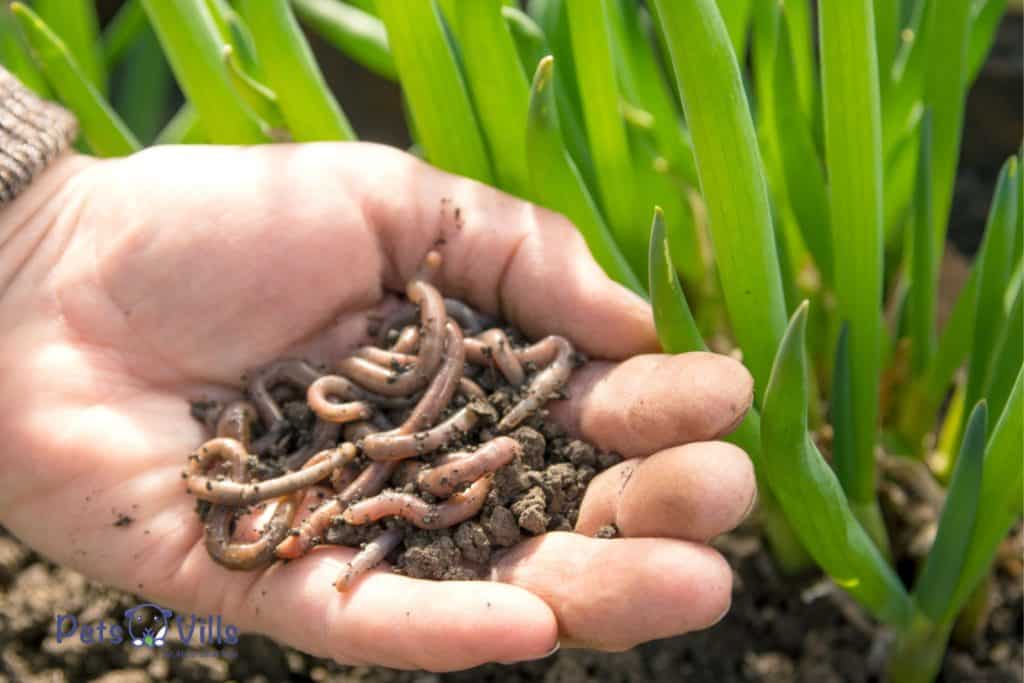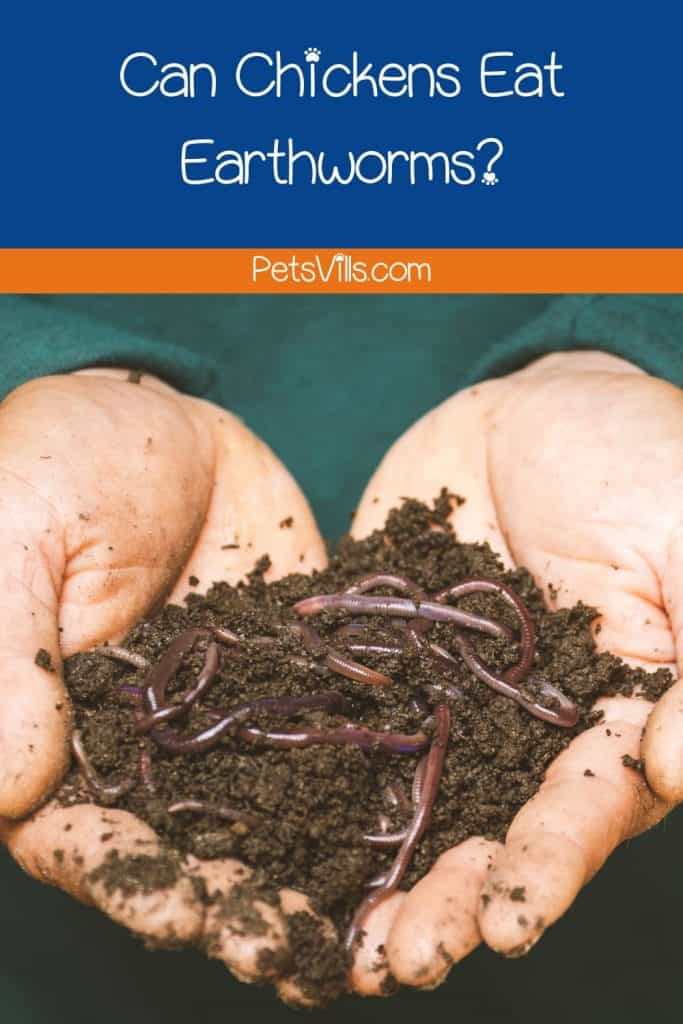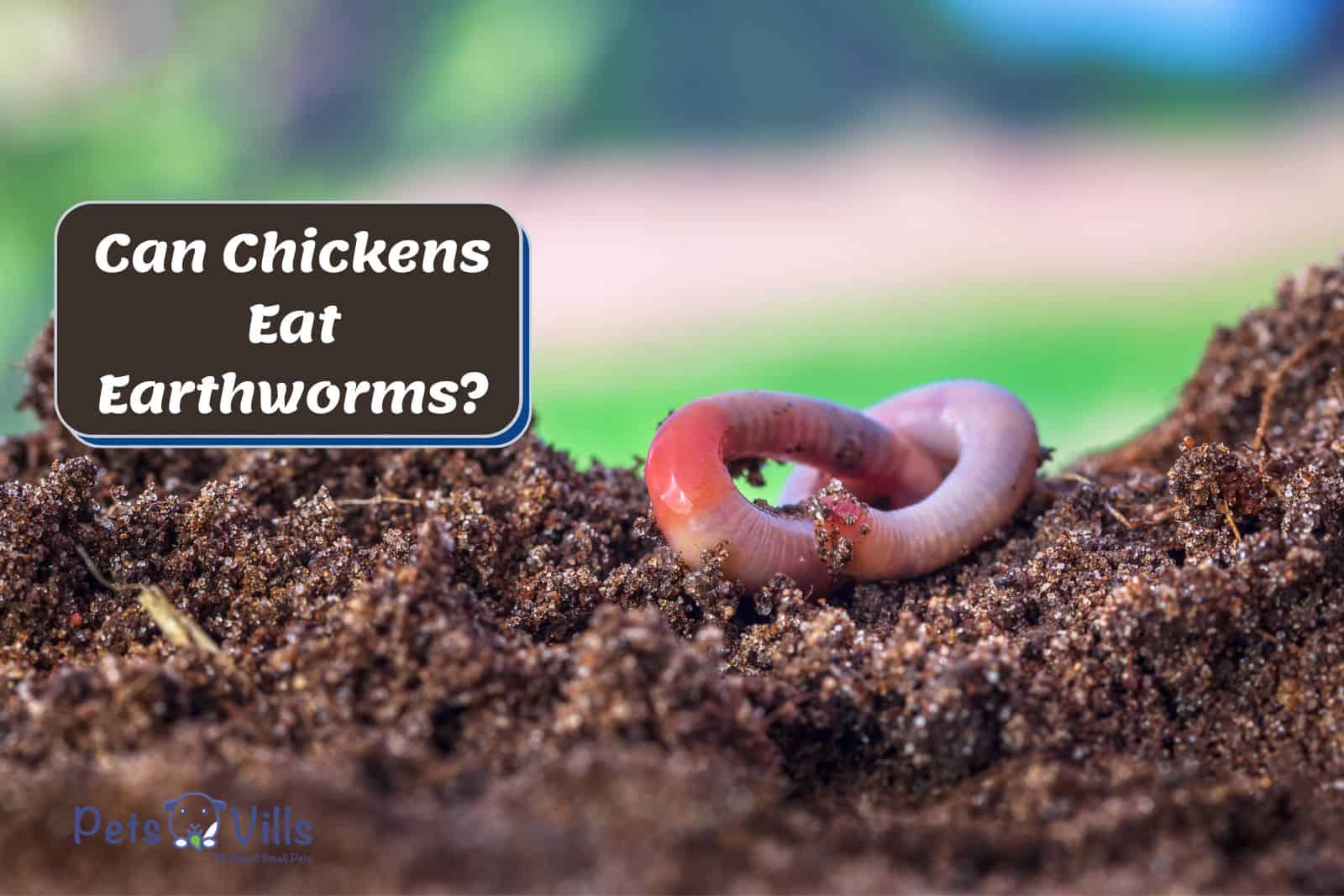Poking at the thought, can chickens eat earthworms?
You’re not alone! I, too, thought about it until I found Bob, an expert, who told me this:
Yes, besides their high nutrition, earthworms are perfectly safe and healthy for chickens and egglayers to eat.
Before you leave cold turkey, read on to discover all these tricks and tips to feed mealworms…
Table of Contents
Key Takeaways
- Earthworms are an excellent nutritious option to feed your chickens
- Offer these types of worms as an occasional treat or sprinkle them in a meal
- Beware of feeding your chickens too much of these: too much protein and worm overload are risky side effects!
Health Benefits of Earthworms for Chickens
Registered dietician Amber Charles Alexis writes, “Food composition studies of edible insects, including worms, reveal that they’re a good source of protein, healthy fats, vitamins, and minerals — even comparable or superior to animal protein” [1].
Earthworms roam in the soil and usually find themselves on the dinner plate of many creatures, including birds and insects.

If you are the proud owner of a chicken flock, you’ll be glad to hear this:
The worms are rich in vitamins, minerals, and other nutrients and present a healthy snack for your chickens.
In-depth research by The Royal Society states that nutrition in these worms is highly “desirable food,” both for humans and animals [2].
Earthworms are not only high in protein but also abundant in amino acids.
Some of these minerals include calcium, copper, iron, manganese, and zinc, which are vital for your chickens’ health.
Further research shows how the Chinese used earthworms as a traditional medicine for 2300 years.
Now if you’re curious about earthworms like me, here is a video with some more juicy facts:
The reality is most people are disgusted by worms and won’t eat them, but for those who consume them, these worms benefit their health tremendously.
What’s more, chickens enjoy these slippery treats.
As an experiment, next time it rains, watch your chickens. You’ll see how they hunt for those worms and enjoy finding them.
Do you know why? They love them. And best of all, these worms offer your chickens nutritious essentials.
Looking to spice up your baby chicks’ diet with some tasty treats? Check out our articles on ‘can baby chicks eat mealworms‘, ‘are maggots good for chickens‘, and ‘can chickens eat tomato hornworms‘ for some helpful insights and feeding tips!
Risk Involve Eating Earthworms
If I were to say that my advice for can chickens eat earthworms has only good news, I’d be lying. Here are the bad and the ugly:
Earthworms are neither toxic nor pose any risk to your chickens, nor do they have any sharp teeth or claws. But they can carry parasites [3].
Among these is the most sinister parasite, a bad boy called the Gapeworm [4].
Gapeworms can enter your chickens in numerous ways: when your chickens eat foods infected by the worm’s larvae, or when they eat a host (such as an earthworm).
Once a host comes in contact with gapeworms, they will latch on to this host and burrow themselves into their new victim.
These parasites can live in their host for years when they enter their victim.
Here’s the scary part: Your chickens eat the earthworms, and these nasty gapeworms, now inside your chickens, will crawl and live in their trachea or lungs.
Some symptoms to look out for are gasping, head shaking, loss of appetite, and gurgling, eventually leading to coughing and choking.
Should you witness any of these scary symptoms, you must take your chicken to the vet. If you fail to do so, it can choke and die.
Luckily, gapeworms aren’t common. But take note: these creepy crawlies do, in fact, exist.
And, once these worms enter your chickens through these food sources, they can wreak havoc on your entire flock ― to state it lightly.
How To Feed Earthworms To Chickens
When it rains, earthworms will naturally rise to the surface. Once this happens, your chickens will see this new treat and start pecking at them.
If you aren’t lucky enough to have lots of rain (or general wet weather), you can dig for these worms as follows:
Start with the garden and around the yard, and especially explore the areas in which they usually reside: vegetation and plants.
Better yet, you can also purchase earthworms online for a reasonable price from stores like Amazon.
“What’s so brilliant about online shopping,” you may ask. Let me tell you the terrific benefits of getting these worms online:
- Live, healthy red wiggler earthworms
- Grown in Sustainable Conditions
- Great for composting and producing quality castings for fertilizer
- Excellent and clean pet food
- Sold by Weight, Full value
Once you have obtained your slippery worms, place them in a feeder. The result? A delicious, savory chicken meal!
How Much And How Often To Feed Earthworms To Chickens
When it comes to earthworms, there are no limits to how many chickens can eat. If the chickens roam free, they will eat as many as they can get.
Once you decide on earthworms, your chickens will consume these worms until they are full. Once they’ve eaten enough, they’ll ignore the rest.
But, you’ll want to limit the amount of the earthworms fed to them. To meet their protein requirement, your chickens will eat around 50-150 worms daily.
This amount does depend on your chicken and can differ greatly.
Earthworms are very nutritious, but it doesn’t have all the nutrition that the chickens require daily.
Overeating of the earthworms could cause chickens to stop eating their staple food of commercial feeds.
When feeding them earthworms, only feed them fresh live ones. Never feed your chickens dead ones or those close to dying.
Dead and dying worms could contain parasites and other dangerous pathogens. So, steer clear of these types.
FAQs
Do chickens like earthworms?
Certainly! Chickens tend to delight in earthworms. They are actively headhunting for worms and will jovially chase them!
Can your chickens eat too many worms?
Yes. If you let your chickens roam free, they can get help themselves too often.
If this happens, their diets will lack the essential nutrients. So, promote variety!
Conclusion
Now that you’re convinced that the answer to can chickens eat earthworms is yes, you are in for more.
Thanks to these types, among the many worm types, a healthy digestive tract for your chickens is possible.
You are what you eat, so it’s with chickens: healthy food sculpts healthy chickens.
One of the most terrific worms for chickens and one that offers stellar nutrients are earthworms.
For proper feed, you can season these worms as an occasional treat, or you can feed them as part of a chicken feed ― your choice.
Often, worms in chickens can cause worm infestation: your chickens will eat food with uninvited worms that can say hello.
Some of these worms are fierce and can do a lot of damage to your chickens once entered.
Whatever you do ― feeding or not ― do it in moderation.
Until next time…

Resources
1. Alexis AC. Eating Worms: Nutrients, Safety, and More [Internet]. Healthline. 2022. Available from: https://www.healthline.com/nutrition/eating-worms
2. Paoletti MG, Buscardo E, VanderJagt DJ, Pastuszyn A, Pizzoferrato L, Huang Y-S ., et al. Nutrient content of earthworms consumed by Ye’Kuana Amerindians of the Alto Orinoco of Venezuela. Proceedings of the Royal Society of London Series B: Biological Sciences [Internet]. 2003 [cited 2022 Dec 19];270:249–57. Available from: https://www.ncbi.nlm.nih.gov/pmc/articles/PMC1691235/pdf/12614573.pdf
3. Wakelin D, De Pomerai DI, Behnke JM. Parasites of the earthworm: Monocystis (Protozoa) and Rhabditis (Nematoda) [Internet]. Halton DW, Marshall I, Behnke JM, editors. Cambridge University Press. Cambridge: Cambridge University Press; 2001 [cited 2022 Dec 19]. p. 11–8. Available from: https://www.cambridge.org/core/books/abs/practical-exercises-in-parasitology/parasites-of-the-earthworm-monocystis-protozoa-and-rhabditis-nematoda/A30FEA94E73C0DA71505AF584334CA9F#:~:text=Two%20common%20parasites%20are%20Monocystis
4. LLC A. Gapeworm Infection in Chickens [Internet]. PoultryDVM. Available from: http://www.poultrydvm.com/condition/gapeworms
Alina Hartley is a small-town girl with a ginormous love of bearded dragons. It all started with Winchester, a baby bearded who was abandoned at the shelter by his former owners because of a birth defect that caused one front leg to be shorter than the other. Alina originally went to the shelter looking for a guinea pig, but one look at Winchester and it was love at first sight. From that day on, Alina has dedicated her life to learning everything she can about bearded dragons. She loves helping new beardie parents start their incredible journey with these magnificent reptiles.
Follow her on:
LINKEDIN
TWITTER.
Read her latest articles HERE
Learn more about her HERE.


